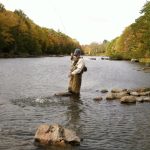By Jay Feldman and Katherine Paul, Special to the BDN
Bangor Daily News op-ed
Rachel Carson would be proud of the Mainers in Ogunquit who on Election Day passed a ballot initiative, with 60 percent of the vote, to ban toxic pesticide use on lawns and landscapes within the town’s jurisdiction. As if guided by Carson’s 1962 book, “Silent Spring,” the Ogunquit Conservation Commission began the community discussion on this trailblazing ordinance — different from numerous pesticide ordinances in Maine and throughout the nation, including a previous one in Ogunquit, because it restricts lawn and landscape pesticide use on all property, public and private, throughout the town.
A marine biologist, Carson warned the nation that our appetite for pesticides raised grave concerns about the effects of chemical-intensive practices, our relationship to nature, chemical effects at the cellular level, and insect and weed resistance to chemical controls. Of the 30 most commonly used lawn pesticides, 17 are linked to cancer, 18 are endocrine disruptors, 19 are reproductive toxicants, 11 are linked to birth defects, 14 are neurotoxic, 22 cause kidney liver effects and 25 are irritants. The U.S. Geological Survey has linked lawn pesticide use to runoff into waterways.
“By their very nature, chemical controls are self-defeating, for they have been devised and applied without taking into account the complex biological systems against which they have been blindly hurled,” Carson wrote. “The chemicals may have been pretested against a few individual species, but not against living communities.”
She warned us to protect the diverse organisms that make up a healthy ecosystem, including bees, birds, butterflies and other pollinators.
The Ogunquit ordinance is timely, given that we are experiencing the worst decline of bee populations in history. Their demise is linked to a constellation of factors, most prominently neonicotinoid insecticides. These are systemic pesticides that make their way through the vascular system of the plant and are expressed through pollen, nectar and guttation droplets, effectively poisoning foraging or pollinating insects and persisting in soil and waterways.
Ogunquit is on the leading edge of communities seeking to stop involuntary poisoning and non-target contamination from runoff, pesticide drift and volatilization that occurs as toxic chemicals move off treated private yards. The ordinance is similar to a law adopted by the city of Takoma Park, Maryland, following bans on cosmetic or aesthetic pesticide use on lawns that have been in place in Canadian provinces for many years. Maine is one of only seven states nationwide that allows municipalities to adopt standards more stringent than state restrictions. The remaining 43 states have some type of preemption law that limits ordinances to only locally owned public property.
The action in Ogunquit leads the way to the widespread adoption of effective non-toxic land management.
“To assume that we must resign ourselves to turning our waterways into rivers of death is to follow the counsel of despair and defeatism,” Carson wrote. “We must make wider use of alternative methods that are now known, and we must devote our ingenuity and resources to developing others.”
Chemical-intensive turf and landscape management programs, similar to those being used by conventional landscapers throughout Maine, are generally centered on a synthetic product approach that continually treats symptoms. In fact, toxic chemicals are not needed for successful turf management.
Organic turf management, which meets the standards of the Organic Foods Production Act, is a “feed-the-soil” approach that centers on natural, organic fertilization with high-quality finished compost. The inputs, along with specific cultural practices that include mowing, aeration, irrigation and over-seeding, are the basis of the program. This approach builds a soil environment rich in microbiology that will produce strong, healthy turf able to withstand stress.
The Ogunquit ordinance is not just about banning pesticides, it is about respecting biological systems that are central to the sustainability of our environment.
Jay Feldman is executive director of Beyond Pesticides, a national advocacy organization for organic and sustainable practices. Katherine Paul of Freeport is communications director for the Organic Consumers Association, an online and grass-roots nonprofit public interest organization campaigning for health, justice and sustainability.











